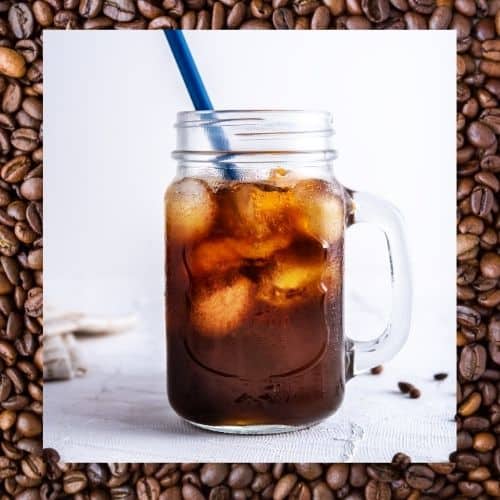
So what is so special about cold brew? I asked myself that same thing at first, dazzled with what I thought was a lot of fuzz about it.
However, when you try cold brew, and especially if you make your own, you understand that there is a lot behind this coffee drink that people love.
Here is my take on what is so special about cold brew:
- It can be a gateway to specialty coffee
- It has a special preparation method: brewed at low temperature, during extended hours, giving it an artisanal feel
- It has a unique flavor, described as mild, sweet, and less bitter than regular coffee
- It is drunk cold
- You can store it for at least a week
- You can take it with you along the road
- It can be mixed with other ingredients to create different beverages
- People claim it feels better to your stomach
Cold brew is a trend that has come to stay. According to this graph from google trends, the term cold brew is being researched more and more after time.

Carry along this post to further discuss what it is that people love about it.
Cold Brew can be a gateway to specialty coffee.
According to Joseph A. Rivera featured in the podcast Keys to The Shop, cold brew is an introduction to specialty coffee for many people. Because it has a milder flavor compared to regular hot brewed coffee, it is easier for someone who is not accustomed to the somewhat harsh flavor of black coffee, to start drinking cold brew.
I can understand that. When I started drinking coffee, I did so with milk and sugar. Then slowly, coffee started to feel too sweet, so I went from tree scoops of sugar to two. Then, It started to taste too sweet again, so I took another spoon of sugar away until finally, I drank it with just milk and no sugar.
Next, I slowly started to test some specialty black coffee. And now, my palate has evolved, and I drink only specialty black coffee and sometimes cappuccino.
Other people have transitioned from cold brew to black hot brewed coffee after having their palate evolve.
When you start drinking black specialty coffee, your taste buds get accustomed to this quality level. It is hard to return to commercial coffee that is usually higher in roasting levels or even has other compounds roasted like sugar or peanuts. It is an evolution that you, as a customer, have, and cold brew can be an introduction to that.
Cold brew has a special preparation method
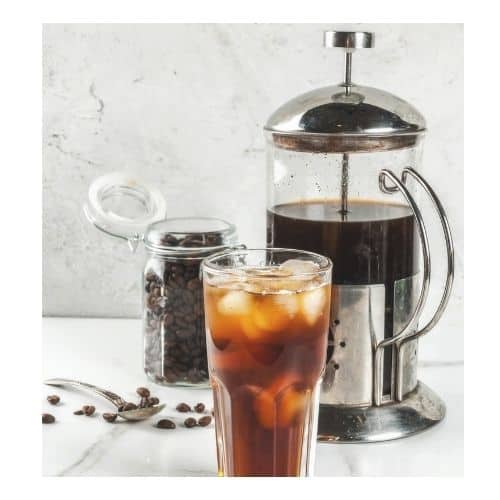
Another reason why cold brew is unique is because of its preparation method.
In contrast to hot brewed coffee, cold brew is prepared slowly at cold temperatures. I have not found a definition that states precisely at what temperature it can be prepared, but I have done it either at refrigeration temperature, during 24 hours or so, or at ambient temperatures during 8 to 10 hours.
The time you brew your coffee depends on your grind size, the roast level, and water temperature. By testing and trying, you can adapt your method and see what works for you.
This is the process I use to create my cold brew at home by using a french press.
I grind specialty Arabica coffee from Costa Rica. I ground it coarse (similar to the size of sea salt).
Then I added seven parts of water per every part of coffee to a french press, and I let it sit for a whole day in the fridge. Specifically, I added 50 g of coffee (close to 7 scoops) to 350 milliliters of water (close to 12 ounces of water). After about 24 hours, I filtered it.
I realized I had made my cold brew too coarse, so I repeated the process more times, grinding a bit finer until I was satisfied with the result.
At this point, you get a cold brew concentrate, which means you can use it to add more water or other liquids to constitute your drink. Because I particularly like strong coffee; for me, there was no need to dilute the cold brew further. However, this comes down to personal preference.
The process is pretty simple, yet there is also science behind it, and some tweaking here and there to achieve the desired flavor. This gives the process an art and science sense to it.
This recipe card describes the process that I used to make a cold brew at home.
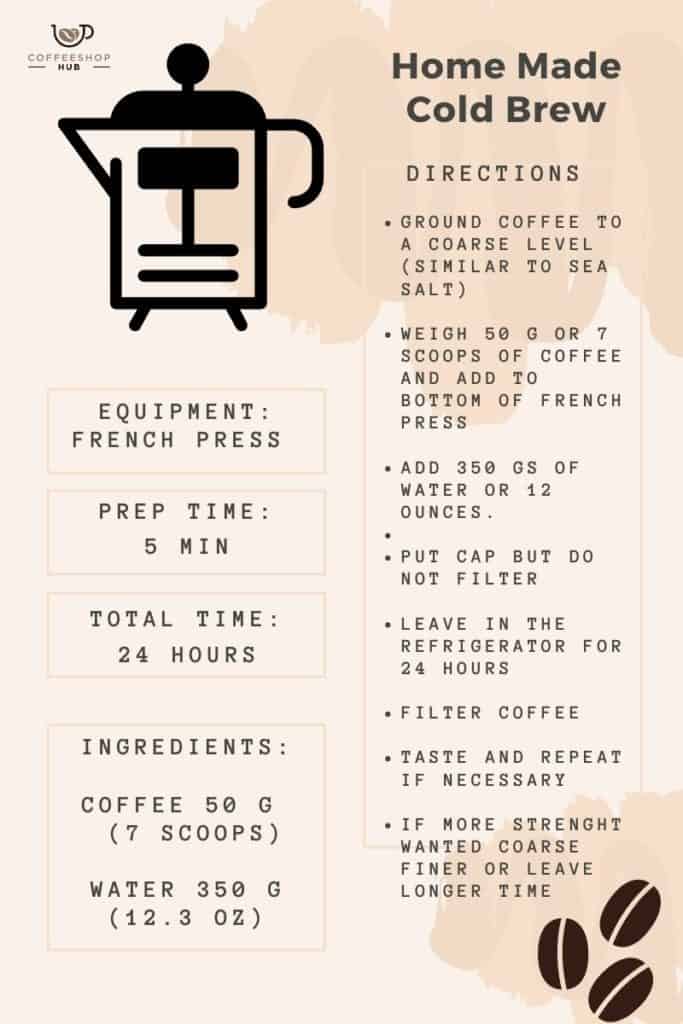
It has a unique flavor, described as mild, sweet and less bitter than regular coffee
Coffee is an amazing, complex drink. A small fruit goes through all these stages of the process from the farming, through the roasting and then the brewing. It is said that the coffee drink has more than a thousand volatile compounds that give it its unique flavor (Celli and Camargo, 2019).
The final step of this process, the brewing, has a strong influence on the final coffee drink’s flavor. There are a lot of variables that are involved in the final flavor.
One of those variables is water temperature. When the coffee grounds enter in contact with water the coffee soluble solids start to dissolve and move towards the water creating the coffee drink.
These coffee soluble solids are composed of acids, sugars, caramelized substances, and the Maillard reaction’s derivates. These compounds are either naturally present in the coffee bean or are formed during the roasting process.
These substances have different solubility characteristics and sizes. This means that they do not dissolve all at the same time. Acids and sugars dissolve first, and then caramelized sugars and Maillard compounds. The latter have a more bitter flavor to them.
The higher the water temperature in contact with the coffee grounds, the more soluble compounds there will be in the water, dissolving first the acids and sugars. In later stages, the caramelized and Maillard compounds.
When making cold brew, the water has an ambient or refrigerated temperature. Depending on where you are located and time of the year this could vary a lot, but let’s say we could have a temperature between 15 celsius or 60 Fahrenheit to 35 celsius or 95 Fahrenheit.
In contrast, when making a hot brew coffee, the recommended temperature is near the water boiling point, close to 95 Celsius or 203 Fahrenheit.
As you can see the temperature difference is huge. Thus, hot coffee has a lot of Maillard and caramelized sugars and therefore has a more complex flavor than cold brew. This is why cold brew tastes milder and is a great introduction for someone who dislikes black coffee.
The second factor that comes into play is time. Because of the low water temperature, if you let coffee sit just a few minutes with the cold water, there will not be enough time for the water to extract the coffee soluble solids. Because there is no aid from a high water temperature, you must compensate for that with a longer brewing time.
Cold brew can be brewed from 8 to 24 hours, depending on the temperature of the water. When you brew at room temperature, it will require less time than when you brew at lower refrigeration temperature.
You may also want to read: why is my coffee strong or weak
Cold brew is drank cold, can be stored and taken along the road
As the name says, cold brew is drunk cold. Therefore it can be highly refreshing to drink on hot summer days.
For this same reason, cold brew can be stored in the refrigerator, and the flavor will not change much during one or two weeks. You could make a large batch, keep it in the fridge, and drink it little by little.
Also, you can pack it and take it with you on the road for refreshment.
It is highly versatile and takes coffee to a whole new level because of the flavor and the temperature and storage conditions.
You can make other drinks with cold brew
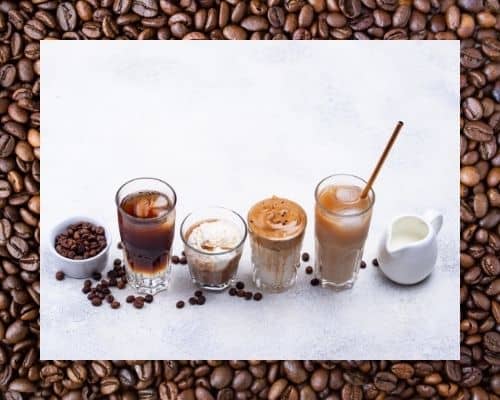
Because of its mild flavor cold brew is widely used to mix with other ingredients and create a variety of drinks.
The most simple ones are to mix it with sparkling water or milk. From then one you can add syrup flavors or alcohol or both. You can also add ice cream for frappes.
Some coffee shops have a menu for cold brew options, and they modify it depending on the season. Being the summer the best for cold brew because it can be quite refreshing.
Another variation of cold brew is nitro cold brew. This one involves adding nitrogen to the cold brew for added flavor.
Remember the cold brew recipe I showed you before? Using a scale, I measured 60 ml of cold brew concentrate (2 ounces) and added 200 ml of tonic water (7 ounces). The result was a very refreshing, slightly sweet drink.
People claim it feels lighter on the stomach.
Some people claim that cold brew feels lighter to the stomach because it has fewer acids than regular coffee.
In a study conducted by Niny Z. Rao and Megan Fuller, the acidity and antioxidant activity of cold brew and hot brew coffee were measured. They concluded that hot brew coffee had more total titratable acids and antioxidant activity than cold brew.
However, coffee drink composition is influenced by so many factors like species of coffee, region of cultivation, type of processing, type of roasting, and method and conditions of brewing.
A review of coffee composition made by Giovanna Bonat CElli and Adriana Costa de Camargo mentions many factors that influence the coffee composition like ratio of coffee to water, water temperature, grind of the coffee, type of filter and type of method, amongs others. This review states differences in caffeine and other compounds when comparing different coffee brewing methods like cold brew, espresso or moka.
Because there are so many factors that influence final coffee drink composition, it may be tough to ensure cold brew has fewer acids.
So whether this can be scientifically proven or not, the truth is that some people do claim that cold brew is lighter to their stomach and this allows them to drink it more than regular coffee. I believe this is true for the person claiming it and therefore at the end it comes down to personal preference.
Some cons about cold brew
We have talked about all the unique aspects of cold brew. However, there are also other aspects that may not be so good about cold brew. One of those is food safety.
When making cold brew, you do not have the factor of hot water temperature to aid you in killing harmful microorganisms. For this reason, because water is cold, you need to be extra careful to make sure these microorganisms are not present when you are making your coffee.
Microorganisms can cause coffee spoilage, but there are other types of microorganisms, called pathogens, that do not show any sign of spoilage but can make you sick if present in a certain amount.
On the other hand, if the equipment you use is not clean but has leftover of old coffee, it can impart odd flavors to your coffee.
When making hot brewed coffee, you have the advantage of the hot temperature that will take care of most microorganisms. Therefore food safety in hot brewed coffee is less of a concern in comparison to cold brew coffee.
Another possible con to some people about cold brew is its flavor. Cold brew can have both people that love it as well as some that hate it.
We talked before about the mild flavor that some people love. Well this same mild flavor makes other people hate cold brew, specially those that are fond of the hot brewed coffee’s complex flavor.
For me, I believe that it is a matter of personal preference. There is no good or bad, there just is. The important thing is to not have one side judging the other, and by this, I mean the people loving cold brew and the ones disliking it.
I hope with this article you were able to get a sense on what is so special about cold brew. And now you can go and enjoy this amazing drink.
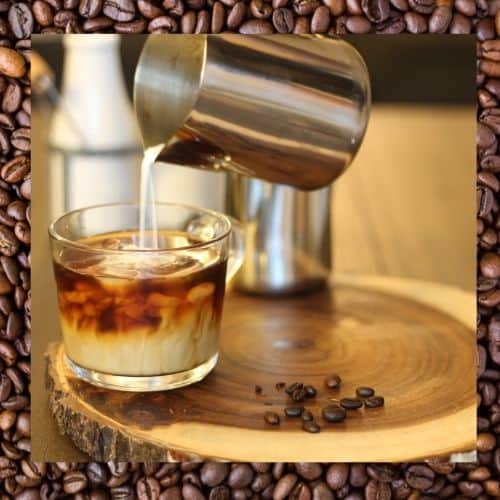
References
Celli, G. B., & de Camargo, A. C. (2019). What is in a “Cup of Joe”? From green beans to spent grounds: a mini-review on coffee composition and health benefits. Journal of Food Bioactives, 6.
Rao, N.Z., Fuller, M. Acidity and Antioxidant Activity of Cold Brew Coffee. Sci Rep 8, 16030 (2018). https://doi.org/10.1038/s41598-018-34392-w
